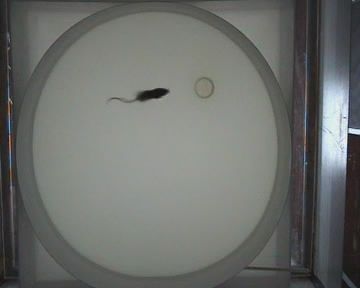The cognitive abilities of mice improved by modifying one gene

Frame from the Limitless film
Genetics significantly improved the mental ability of mice by limiting the activity of only one enzyme in their body, phosphodiesterase-4B ( PDE4B ). These studies may lead to the development of drugs that help people with cognitive impairment or who have age-related problems associated with this function. The project involved scientists from Leeds University (UK) and Mount Sinai, a Canadian hospital.
Mice in which PDE4B activity was suppressed by changes in the genes studied better and faster, retained memory of the events that took place, and solved complex problems better than their usual counterparts. Researchers argue that the mouse is an “ angernon“they better recognize another mouse they were introduced to the day before, and quickly find a hidden exit platform from the Morris water maze.

The Morris water maze ( MWM ) is one of the main tests for studying spatial memory and the learning process in rodents. Now there is There are many variations of this method.The basic version is a pool, usually of a cylindrical shape, filled with tinted milk powder or other non-toxic dye, with water in one of its quarters, a platform whose height a little below the water - so the animal can not see it.

Once in the water, the rodent is stressed and begins to look for a way out of it. For the first time, the platform is either randomly or with the help of the experimenter, but in the process of the experiment, the animal learns to find the platform using spatial memory, and get out on it independently.
Also, mice with low PDE4B levels behaved more calmly under observation - they forgot more quickly about unpleasant moments that occurred a few days ago and spent more time in open, illuminated spaces, while rodents usually try to stay in the shade. In addition, modified rodents were less afraid of the smell of cats.
Researchers suggest that similar effects can be tried in humans, due to the fact that PDE4B is also present in the human body. For example, if successful, such an effect could lead to a mitigation of post-traumatic stresses. Science already knows that the altered activity of phosphodiesterase-4B in humans may be associated with the pathology of schizophrenia and bipolar disorder. But so far, experiments are limited only to rodents.
Now researchers will try to get drugs that suppress the action of this enzyme in order to conduct studies on different types of animals and find out whether the drug will be suitable for clinical tests in humans.
